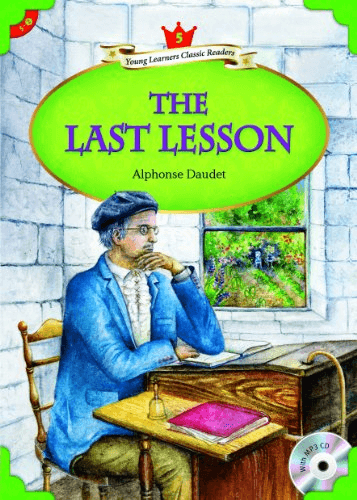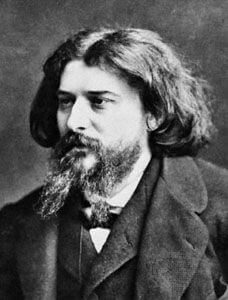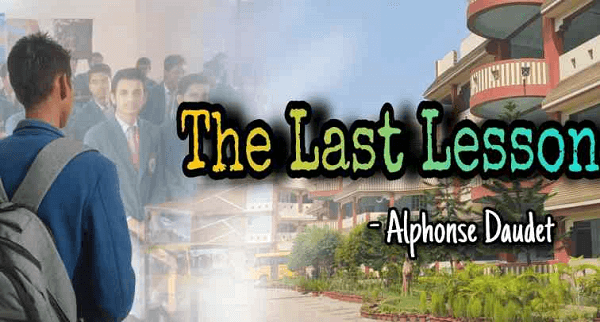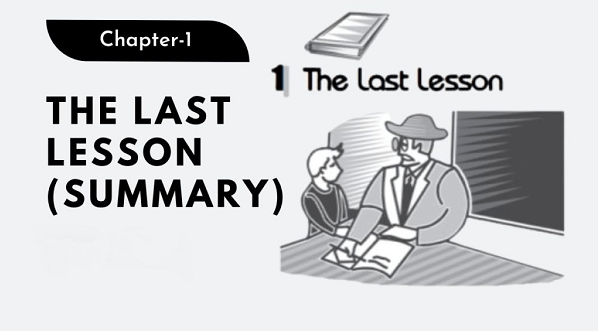The Last Lesson Summary Class 12 EnglishIntroductionThe Prussian invasion of France is described in the 1870 novel The Last Lesson by Alphonse Daudet. Lorraine and Alsace were incorporated when Prussian soldiers conquered France. It was mandated that all French instructors vacate these two areas. M. Hamel's final class was nevertheless devoted and sincere despite everything. 
The author describes one student's apprehension toward M. Hamel. When he first got to school, the pupil was prepared for punishment. The fact that this would be his final lesson, he learned, was shocking. The pupil understood the significance of his language as a result of his inability to acquire it. This lesson illustrates how people experience failure to learn. The Last Lesson: About the AuthorAlphonse Daudet, a celebrated French writer of stories and novels exemplifying the real world, emotions, and mirth, is the writer of The Last Lesson. This renowned story of his focuses on patriotism, the gravity of learning, and how education is a blessing for some. 
As per the lesson provided by the story, you should never underestimate the worth of getting an education. This narrative combines a modern outlook with a captivating plot in a straightforward structure. Theme Of The StoryThe theme of "The Last Lesson" is on the value of language to a nation's population. Everyone is responsible for protecting the nation's language since it is an integral part of its culture. The lesson shows how, after defeating France in the war, the Prussians want to govern not just the country's land but also its citizens' minds and emotions. 
The narrative supports the idea that when something is lost, we cherish it more. Everyone understands how things were taken for granted, and the kids and the instructor are obviously grieving and angering. The lesson places a strong emphasis on the value of everyone speaking their native language and the necessity of understanding that our language is what gives us our independence, respect, and sense of self. The Last Lesson SummaryYoung Boy Franz, who is en route to school, serves as the story's narrator. The instructor, M. Hamel, was going to quiz the class on participles that day, and he had yet to learn what they were, so he was running late and worried he would get in trouble. Despite being tempted to spend the day outside because it was a nice and sunny day, Franz raced off to school instead. As he passed the town hall, he noticed that there was a crowd gathered in front of the notice board. That board had been up there for the previous two years, displaying all the bad news. Franz was astounded to arrive at the school and find everything to be so still. Everything was as quiet as Sunday morning when a terrible silence descended upon the school. He noticed that all of his classmates were already seated and that M. Hamel was walking up and down the room with an iron ruler under his arm. He opened the door and walked into the classroom, afraid. Instead of reprimanding him, M. Hamel kindly asked him to go to his residence. 
The moment Franz sat down at his seat, he noted that the instructor was dressed in his lovely green coat, frilled shirt, and tiny black silk cap with embroidery. He would only dress in this costume on major days like inspection and reward days. Franz was particularly shocked to see local residents occupying the rear seats of the school. Hauser, one of the villagers, had brought over an outdated primer. M. Hamel mounted on his chair and informed the students that this would be their final French lesson and that the new teacher would start teaching at the Alsace and Lorraine schools the next day. This order had come from Berlin, which stipulated that only German would be taught there. Franz found this quite unexpected. The order that had been posted on the notice board, he realized, was exactly as it had been. He laments squandering the time instead of using it to learn his lesson. His thoughts about his teacher, of how weird and grating he was, changed when he realized that he didn't want to give up his books, which had felt like a burden a while earlier. He realized that the village residents had gathered there to thank the teacher for his 40 years of devoted service, demonstrate respect for their nation and that the instructor had dressed in his Sunday best in honour of the final class. Franz heard his name calling to repeat the rules of participles as the lesson began. The first few sentences baffled him, and he embarrassedly stood there. M. Hamel claimed he wouldn't correct him since he must be feeling guilty enough now. He berated the Alsatian populace for postponing their education. He also accused their parents of not caring enough about their education and of forcing them to work so they could make a little more cash. He also blamed himself for the unsatisfactory performance of students. The French language was then discussed by M. Hamel, who referred to it as the most beautiful language in the world and said that it should be safeguarded since speaking the language of one's captors is equivalent to possessing the key to that person's jail when they are enslaved. Then he gave the class a grammar lesson. To see how well he comprehended it, Franz was astounded. The teacher was really kind as she patiently explained everything. A writing lesson was given after the grammar lecture. All the students worked very seriously. The only sound in the classroom was made by the pens scratching over the page since it was so quiet. Franz wondered if pigeons would also be forced to sing in German when he saw them cooing on the school roof. M. Hamel remained still in his chair the entire time, gazing closely around the room as if trying to fix in his mind exactly how everything seemed there. Franz thought about how hard it must be for him to leave the nation the next day. After finishing their writing, the students shouted the alphabet, followed by a history lecture. The letters were spelled by the older Hauser who was in the rear of the room. By the time the talk was over, everyone was starting to cry. Class was to conclude when the bells of the church rang twelve and the Angelus began. M. Hamel was overcome with a choking when he got out of his chair to speak. He then wrote "Vive La France!"-which is French for "Long Live France!"-as large as he could on the whiteboard. He leaned back against the wall, motioning dismissably. At the end of the lecture, he dismissed the class with a gesture while leaning his head against the wall. ConclusionOn a very heartfelt note, the narrative comes to a conclusion. The loss of their independence under the Prussians' rule in Alsace angered the region's residents on the one hand. However, they had also realized what they would miss - the independence and privilege of learning their native tongue, both of which they had previously taken for granted. According to the Last Lesson Class 12 report, the villagers become more patriotic as a result of the teacher's departure. By displaying extraordinary mental fortitude, we can observe how the Alsatian people prepare for a new harsh reality tomorrow.
Next TopicLost Spring Summary Class 12 English
|
 For Videos Join Our Youtube Channel: Join Now
For Videos Join Our Youtube Channel: Join Now
Feedback
- Send your Feedback to [email protected]
Help Others, Please Share









